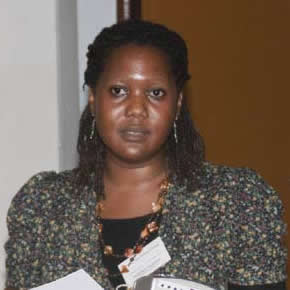Schiller Institute Intervention at Ndjamena, Chad Forum
The Schiller Institute’s
Worldwide Reconstruction Program
Comes to Africa
November 2010
Preliminary Conference Report : Save Lake Chad
Schiller Institute Brings NAWAPA Approach to Chad (Full Report)
On the last weekend of October, the international battle waged by the Schiller Institute since 1984 for a dialogue of civilizations through the launching of great infrastructure projects, made a giant step. In the heart of one of the poorest countries devastated by wars and famine, “The 8th World Forum for Sustainable Development” took place, in Ndjamena, Chad, which was jointly organized by the French government through the environmentalist think-tank, Passages-Adapes, and the Chad government, and drew thousands of participants from the Africa, Europe and the Middle-East. What was apparent from the very beginning was the overwhelming presence of the fascist environmentalist agenda within the European pseudo-scientific community, which geared the debate towards discouraging the project for refilling the Lake Chad from the Oubangui (or Ubangi) River, a tributary of the Congo River, as too expensive and having negative effects on biodiversity. Roland Pourtier, head of the Association of Professors, even called to remove the taboo of Malthusianism!
Thankfully, the vice president of the Schiller Institute in Germany, Portia Tarumbwa-Strid, was invited to make a contribution at the scientific panel. She presented the global strategic situation of the world financial disintegration with the increase in food speculation as a consequence of the bailouts. Then she developed the real physical perspective for the next 50 to 100 years for Africa, with the Transaqua project, the development of a continental magnetic levitation railway system, and the development of the 4th generation of nuclear reactor in nuplex cities. The contrast was so huge, that the eyes of most of the people who were also on the panel popped right out of their sockets. The African and the Arabic people were, however, very enthusiastic and reacted positively. Dozens of people came up to receive the dossier “Africa : The time has come for great projects”, published in French, as well as the DVD with material in English, French and Arabic.
On the third day, the political segment of the forum with no less than 5 heads of state present, took place : Wade (Senegal), Goodluck (Nigeria), Bozize (Central African Republic), Khadafi (Libya) and Deby (Chad). Other delegations with the top brass from diverse African countries were also there. At the press conference we were able to intervene once again to bring reality on the table. Sebastien Perimony, with the Cheminade in 2012 presidential campaign, asked a question addressed to Mr. Deby on the bankruptcy of the world financial system, and posed the paradox that here they are looking for funds for development, whereas other parts of the planet are giving trillions of dollars to bankrupt banks, therefore the problem cannot be the money but the system itself. He asked him if he was ready to have a top-down approach as the Schiller Institute had presented during the seminar, and go for a real physical recovery with the Transaqua project.
The President answered by making a very beautiful answer about the future generations but nothing on the crisis. Mr Wade, asked to answer the question too, saying that he wrote a paper for the financial times during the subprime crises to say that the bailout policy was not the right thing to do. Unfortunately he went back to the rules of the game and talked about limiting the intervention of men around Lake Chad: repeating the mantra of the green fascist ideology.
Despite this, the concept of biospheric engineering was very well received by the serious people there, particularly the delegations from Central African Republic, and of Congo-Brazzaville, with whom we organized meetings later on.
In other private discussions in and around the conference, there was a high recognition factor from the U.S. delegations of LaRouche and the Glass-Steagall mobilization, as with the French delegations, which immediately recognized Jacques Cheminade. The Germans were rabidly against large-scale infrastructure projects, and even denied there being a hunger crisis in Niger and Chad. The fact that there were no delegations from Russia, China or India proved to be the reason why the European pseudo-scientists could demonize great infrastructure projects. That is why LaRouche’s Four Powers Agreement is the only way to implement the Schiller Institute’s vision for worldwide reconstruction.


